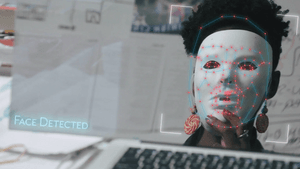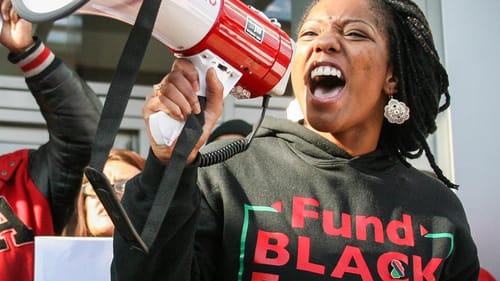Stay in the Loop
BSR publishes on a weekly schedule, with an email newsletter every Wednesday and Thursday morning. There’s no paywall, and subscribing is always free.
Beyond ourselves
‘Coded Bias,’ ‘Unapologetic,’ and ‘Nationtime - Gary’ at the 2020 BlackStar Film Festival

The ninth annual BlackStar Film Festival, featuring the work and stories of people from the African diaspora and global communities of color, is screening August 20 through 26. The festival, which has historically convened at International House (previously located in University City), has adapted to COVID-19 with the launch of a virtual platform and format, alongside three offerings screened in person at the Mann Center’s new Philly Drive-In.
2020 has been stranger than fiction, and the past few months have been particularly rife with drama. When your reality starts to feel more like sci-fi, it becomes increasingly difficult to parse out what is true or what is right. It is the work of documentary to both capture these moments in time and contextualize these events (and perhaps corroborate or challenge our memories and perceptions of said events). Done well, documentary holds up a mirror to see ourselves and others in new and different lights and angles, reflecting new answers and new truths. Three documentaries at this year’s BlackStar shine a light on what it means to be a Black American at this moment in history.
Coded Bias
As Blackstar adapted to COVID-19, so have we. We are more dependent on technology for our work, social lives, education, entertainment, and other connections. During such unpredictable and unprecedented times, these tools have brought us great comfort and convenience. But at what cost?
Director Shalini Kantayya’s Coded Bias, which premiered earlier this year, implores us to consider the ways in which the collection, coding, manipulation, and surveillance of our data can unjustly determine our destinies. Algorithms are not neutral or innocuous when they contain the implicit biases of their creators, primarily white, straight, cisgender men. As a result, our technology replicates the same oppression and inequalities that marginalized populations already face, and has a disproportionate negative impact on Black people.
These play out into disparate job opportunities, unequal access to housing, gaps in educational attainment, and much more. One example from the film is of Philadelphian LaTonya Myers, who had been a model returning citizen when an algorithm that decides parole conditions labelled her “high risk,” despite all her best efforts at compliance. Someone who turns her life around could end up right back in prison because an algorithm wasn’t able to take into account all the ways she had evolved and changed for the better. In a world where we can’t just opt out of the matrix, Coded Bias is a must-see to better understand the implications of big tech and our new web-based reality.

Unapologetic
Months into the pandemic, many became aware of a second pandemic—the racism and violence routinely experienced by Black people on systemic and individual levels. A series of high-profile killings made us know the names of George Floyd, Breonna Taylor, Ahmaud Arbery, and many others, most recently Jacob Blake.
The resulting uprisings and protests from Philly to Portland are just like the ones captured in Ashley O’Shay’s Unapologetic, which got its world premiere at this year’s festival. The documentary illuminates the aftermath of the police killings of Rekia Boyd and LaQuan McDonald in Chicago (Boyd was killed in 2012; McDonald in 2014). O’Shay follows two young Chicago-based activists, Janaé Bonsu and Bella Bahhs, over five years as they tackle personal growth and challenges while also fighting as abolitionists and organizers.
The film does an excellent job of demystifying the lives and work of activists, who are ordinary people balancing their regular responsibilities with the weight of their sense of moral duty to justice and humanity. The film also explores how the unsung heroes of organizing work often exist at the intersections of Black, gender-oppressed, and queer. Just as inspiring as it is to watch these women progress over time, it is equally frustrating to witness how infuriatingly slowly and stubbornly the arch of justice bends. Unapologetic reiterates the imperative of not looking away, and continuing to support and uplift the work of those who stay in the streets long after the headlines and hashtags fade.
Nationtime - Gary
Between last week's Democratic National Convention and this week's Republican National Convention, we find ourselves in the midst one of the most polarized presidential election cycles in history. While the first nomination by the Democratic Party of a Black, female candidate for vice president may act as proof of progress for some, blatant attempts at voter suppression and international election interference persist. Both parties continue to vie for the elusive “Black vote.”

1972’s Nationtime - Gary, from director William Greaves, looks back at the first National Black Political Convention, which attempted to make a single Black agenda ahead of the presidential election of 1972. More than 10,000 Black delegates and 500 members of the media convened in Gary, Indiana to try to unify the various segments of Black America. What they found out from this experiment still holds true. Blackness is not a monolith, and the persistent and perpetuated beliefs in inherent commonalities beyond skin color are regularly debunked. Some want economic empowerment while others prioritize education; some want abolition and others demand more jobs.
The film focuses primarily on the stirring speeches of Black male political and popular figures of that era (a young Jesse Jackson, actor and activist Harry Belafonte, Black Panther Party co-founder Bobby Seale, and others) but the presence (or lack thereof) of Black women is most striking. The wives of slain heroes Martin Luther King, Jr. and Malcolm X are given prominent seating on the speakers’ dais like royalty, but are not given the same space to share their political thoughts and insights. Coretta Scott King receives a multiple-minute standing ovation but never speaks, and Betty Shabazz speaks only to introduce Jesse Jackson. Throughout the film, we see the two women talking intently to each other in the background. Noticeably absent altogether is Shirley Chisolm, who made her historical presidential bid that same year.
As November 2020 approaches, Nationtime - Gary is a useful reminder that the choices we make and actions we take affect not only us, but also the collective. We won't all reach the same conclusions, but if we are taking more than ourselves into consideration, we will be better because of it.
What, When, Where
Coded Bias. Directed by Shalini Kantayya. Screened at the BlackStar Film Festival on August 21, 2020.
Unapologetic. Directed by Ashley O’Shay. Screened at the BlackStar Film Festival on August 20, 2020.
Nationtime – Gary. Directed by William Greaves. Screened at the BlackStar Film Festival on August 23, 2020.
The 2020 BlackStar Film Festival runs August 20 through 26, with most screenings streamed online.
BlackStar’s online platform easily allows various accessibility features for at-home viewers.
Sign up for our newsletter
All of the week's new articles, all in one place. Sign up for the free weekly BSR newsletters, and don't miss a conversation.

 Hanae Mason
Hanae Mason